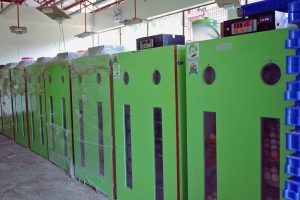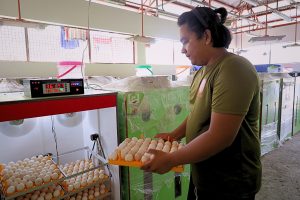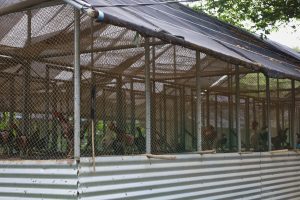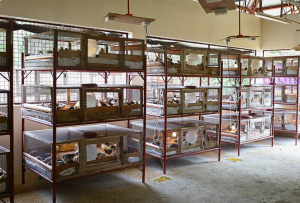FEATURE: Guimaras’ crowing success in local poultry – The story of Isla de Guimaras native chicken production and marketing enterprise
Posted by: RAFIS DA6 | Posted at: October 4, 2024
The Isla de Guimaras Native Chicken Production and Marketing Enterprise, funded under the Department of Agriculture’s Philippine Rural Development Project (DA-PRDP), has emerged as a model of success in the local poultry industry. This transformative initiative, spearheaded by the Buenavista Development Cooperative (BDC) in collaboration with its cluster members, the Concordia Livestock and Poultry Raisers Association and the Guimaras Poultry and Livestock Raisers Association, has generated substantial economic growth and created meaningful employment opportunities for the community.
The project was fully operationalized in 2023, which was timely given the growing demand for native chicken meat in the Philippines. Native chicken production has been a common livelihood for many farmers in Western Visayas, providing additional income and a source of protein. Consumers highly prefer the meat of native chicken due to its distinct taste, leanness, and pigmentation. Based on the Philippine Statistics Authority (PSA), the country’s average annual inventory of native chicken increased by 3.1 percent from January 2020 to January 2021. It contributed to the country’s total chicken population of 12.86 million heads as of January 1, 2021. Similarly, there is a positive growth trend in the Western Visayas region and its provinces, with the highest record of 12,448,333 metric tons in 2019.
Before the enterprise was established, native chicken production in Guimaras was primarily a backyard family economic undertaking with limited marketable product volume. The native chicken growers faced various challenges, including low incomes, high mortality rates due to diseases and pests, and a lack of proper care and management knowledge. Many growers did not keep records or have consultants for their projects.
The Isla de Guimaras Native Chicken Production and Marketing Enterprise has substantially impacted the local economy and employment landscape. With a total investment of Php 14,999,751.48 from the DA-PRDP and about Php 4.8 million in equity from BDC, the project has facilitated the construction of a state-of-the-art main building, grow-out, and breeding houses for the enterprise.
In less than a year, the project has achieved Php 1,081,515.50 financial success and created employment opportunities for a significant number of individuals, including farm supervisor and farm keepers. These workers receive monthly remuneration according to the standards set by the Department of Labor and Employment (DOLE) Philippines, and their membership in the lead proponent group’s cooperative ensures coverage under life and accident insurance.
This livestock project aims to produce 2,500 live chickens in one week. The two satellite farms in Nueva Valencia and San Lorenzo are now equipped with three grow-out buildings each to contribute to this target. The main farm in Buenavista operates on a larger scale, featuring six breeder houses and three additional grow-out buildings. The farm’s native chicken stocks are a mixed breed of Darag and Joloano, with a current focus on attending to 1,248 breeder stocks. Presently, they are managing 2,000 chickens per building. The total chicken population across the operation stands at approximately 5,000.


This local enterprise has implemented a range of best practices and innovative strategies that have contributed to its astounding success. Under the supervision of Joe Harvey Gustilo, the Assistant General Manager of Allied Services of the BDC, the enterprise has leveraged cutting-edge technologies and sustainable farming methods to optimize its operations. One of the key innovations is the enterprise’s partnership with the Central Philippine University (CPU), which has provided valuable technical expertise and guidance. The farm’s operations is guided by the research and recommendations of Dr. Jaime Cabarles, a renowned expert in the field.

“Our mission is to help the community and to provide a food chain for Guimaras,” Joe Harvey explains.
The enterprise’s commitment to sustainability is evident in its adoption of organic and natural farming practices. The farm utilizes a diverse array of locally sourced feedstock, including upland kangkong, malunggay leaves, kamote leaves, and madre de agua, to ensure the optimal nutrition of its chickens. Additionally, the farm employs natural remedies, such as garlic and lemongrass, to prevent diseases and maintain the health of its livestock.
Another notable best practice is the enterprise’s meticulous attention to biosecurity. The farm has implemented strict protocols to safeguard the health and well-being of every stock, including regular blood tests and swab checks before selling the birds. This commitment to biosecurity has resulted in a remarkable low mortality rate, with the farm reporting only 23-26 deaths per month.
The Isla de Guimaras Native Chicken Production and Marketing Enterprise has faced its fair share of challenges, particularly in the face of environmental factors such as the El Niño phenomenon. During periods of extreme heat, the farm has had to adapt its feeding and watering practices, utilizing wet feeding and ensuring the housing temperature remains cool. The enterprise has also implemented measures to address the impact of El Niño on its incubators and egg production, such as increased misting and the Guimaras Provincial Government provided water and electricity for the poultry farm.


“Farming and agriculture is not a perfect science, you need to do something to improve and maximize your resources,” Joe Harvey explains.
Additionally, the farm’s proximity to residential areas has presented security challenges, with the enterprise having to contend with intruders and stray animals. To mitigate these issues, the farm has emphasized the importance of vigilance and adherence to strict protocols among its workers, fostering a culture of proactive problem-solving.
“A single mistake can lead to a chain reaction, so we have to be very careful,” Joe Harvey added.
Despite the challenges, the Isla de Guimaras Native Chicken Production and Marketing Enterprise has demonstrated resilience and adaptability. The enterprise has forged strategic partnerships with leading restaurants and resorts, such as Tatoy’s Restaurant in Iloilo and a resort in Barbaza, Antique, to expand the reach of its native chicken products.
However, the enterprise’s success has also led to a high demand that exceeds its current supply capabilities. Many potential customers have expressed interest in establishing contracts with the enterprise, but the farm’s limited production capacity has made it difficult to accommodate all requests.
The Isla de Guimaras Native Chicken Production and Marketing Enterprise is confident to continue its growth and expansion. With the support of the DA-PRDP and its collaborative partnerships, the enterprise is well-positioned to further enhance its production capabilities, explore new market opportunities, and solidify its position as a leading player in the local poultry industry. ###(DA-RAFIS-6) Photos by: MSSubang






